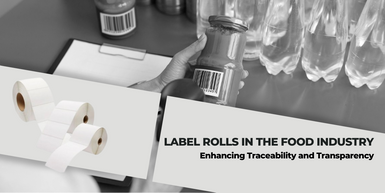Posted by LabelWarehouse on 19th Mar 2024
Label Rolls in the Food Industry: Enhancing Traceability and Transparency
It is a given that ensuring traceability and transparency in the food that we consume is crucial, because who would want any surprises when it comes to what's served on our plate, right?
Take the seafood industry, for example. They've been under the microscope lately because of concerns about issues like illegal fishing and mislabelling. Hence, some companies are using QR codes and blockchain to keep tabs on the fish from ocean to table. It's like a digital passport, telling you exactly where it's from and how it got there. Recent statistics from the Food and Agriculture Organisation (FAO) say that about 20% of seafood worldwide is mislabelled! And that's a big deal. By ramping up traceability, we're not just keeping our food safe and sustainable, but we're also giving consumers the transparency they deserve.
When it comes to transparency in the food industry, label rolls play a crucial role, offering a reliable means to track products throughout the supply chain. In this blog, we have discussed how label rolls help in enhancing traceability and transparency in the food industry.
Let’s start by defining-
Traceability and Transparency in the Food Industry
Traceability in the food industry refers to the ability to track the movement of a food product along the supply chain, from its origin to the point of sale or consumption. This involves documenting and maintaining records of various stages of production, processing, and distribution. Let’s consider a bottle of olive oil. Traceability in this case would involve tracking the olives from the farm where they were grown, through the processing facility where they were pressed into oil, to the bottling plant where the oil was packaged, and finally to the retailer where it is sold. Each step of this journey would be documented, allowing for quick identification and recall of the product if any issues arise.
Transparency, on the other hand, refers to the openness and accessibility of information regarding the production, sourcing, and other relevant aspects of a food product. It involves providing consumers with clear and accurate information to help them make informed decisions about the products they purchase. Take the example of a package of organic granola bars. Transparency, in this case, would involve clearly labelling the packaging with information such as the ingredients used, their sources (e.g., organic farms), any certifications obtained (e.g., USDA Organic), and any relevant production practices (e.g., gluten-free, non-GMO). By providing this information, the manufacturer allows consumers to understand what they are buying and to make choices that align with their preferences and values.
Different Types of Label Rolls Used in the Food Industry
It is a known fact that thermal label rolls play a crucial role in the food industry, providing product identification, traceability, and compliance with regulatory standards. There are different types of label rolls designed to meet different needs such as:
Direct Thermal Label Rolls
These label rolls are widely used for short-term labelling applications in the food industry. Direct thermal labels as we know are heat-sensitive and do not require ink or ribbons for printing, making them convenient for labelling perishable items such as fresh produce, dairy products, and bakery items.
Thermal Transfer Label Rolls
Thermal transfer label rolls are similar to direct thermal labels but use a ribbon to transfer ink onto the label material. They offer better durability and resistance to fading and smudging, making them suitable for labelling frozen foods, canned goods, and other products requiring long-term durability.
Water-Resistant Label Rolls
These label rolls as the name suggests are designed to withstand exposure to moisture and liquids, making them ideal for labelling products that are stored or transported in wet environments. Water-resistant labels are commonly used for labelling bottled beverages, condiment containers, and refrigerated foods.
Removable Label Rolls
Removable labels feature a low-tack adhesive that allows them to be easily removed from surfaces without leaving behind residue or damaging the packaging. These label rolls are often used for temporary or promotional labelling of food products, such as seasonal promotions or limited-time offers.
Tamper-Evident Label Rolls
Tamper-evident labels are designed to provide visual evidence of tampering or unauthorised access to packaged food products. These labels typically feature a breakable seal or perforation that is visibly damaged when the package is opened, providing assurance to consumers of product integrity and safety.
Custom Printed Label Rolls
Custom printed label rolls are tailored to the specific branding and labelling requirements of food manufacturers and retailers. These label rolls can feature company logos, product information, barcodes, and other custom designs to enhance product presentation and brand recognition.
Significance of Label Rolls in the Food Industry
The significance of label rolls extends across different stages of the food supply chain, starting from production and processing to distribution and retail.
Product Identification
Label rolls enable accurate and consistent labelling of food products, providing essential information such as product name, ingredients, nutritional content, allergens, and expiration dates. Clear and legible labelling helps consumers make informed purchasing decisions and ensures product differentiation on store shelves.
Traceability
Label rolls facilitate traceability by allowing food manufacturers to track the movement of products throughout the supply chain. Each label may contain unique identifiers such as barcodes, QR codes, or RFID tags, which can be scanned and recorded at various checkpoints. This traceability enables swift identification and recall of products in case of quality issues, contamination, or food safety incidents, thereby safeguarding consumer health and minimising the impact on brand reputation.
Regulatory Compliance
Label rolls help food manufacturers comply with labelling regulations imposed by government agencies and industry standards. Labels must accurately reflect the contents of the product and adhere to specific requirements regarding font size, language, and placement of information. Failure to comply with these regulations can result in fines, recalls, or legal consequences. Label rolls ensure consistency and adherence to regulatory standards, thereby mitigating compliance risks.
Consumer Transparency
Labels serve as a communication tool between food producers and consumers, providing transparency regarding the origin, ingredients, and production practices of food products. Consumers increasingly demand information about the sourcing, sustainability, and ethical considerations associated with their food choices. Label rolls enable manufacturers to convey this information effectively, building consumer trust and loyalty.
Brand Recognition
Well-designed labels contribute to brand recognition and differentiation in a crowded marketplace. Label rolls allow food manufacturers to customise labels with branding elements such as logos, colours, and graphics, creating a distinct identity for their products. Consistent branding across product lines enhances brand visibility and strengthens consumer loyalty.
Quality Assurance
Labels serve as a visual indicator of product quality and integrity. Properly labelled products convey a sense of professionalism and attention to detail, instilling confidence in consumers about the quality and safety of the food they purchase. Label rolls enable manufacturers to produce high-quality, standardised labels that meet industry standards and consumer expectations.
How to Choose the Right Label Rolls for the Food Industry?
To ensure accurate labelling, compliance with regulatory standards, and effective product identification, choosing the right label roll is essential. To pick the correct label roll, consider the following factors:
Label Material
Opt for label rolls made from materials that are suitable for the specific conditions in which your products will be stored and transported. For example, if your products will be exposed to moisture or refrigeration, choose water-resistant or freezer-grade label materials to prevent smudging or deterioration.
Adhesive Properties
Consider the adhesive properties of the label rolls to ensure they adhere securely to various packaging materials commonly used in the food industry, such as glass, plastic, or cardboard. Choose labels with adhesives that are compatible with the surface texture and temperature conditions of your packaging.
Label Size and Shape
Select label rolls that offer the appropriate size and shape for your packaging requirements. Ensure that the labels fit comfortably on your product packaging without covering important information or interfering with barcodes, expiration dates, or other essential details.
Printing Technology
Determine whether your labelling system requires direct thermal or thermal transfer printing technology. Direct thermal labels are suitable for short-term applications and do not require ink or ribbons, while thermal transfer labels offer greater durability and resistance to fading.
Regulatory Compliance
Ensure that the label rolls comply with relevant regulatory standards imposed by government agencies and industry organisations. Check for certifications such as FDA compliance for food contact materials or adherence to labelling requirements specified by organisations like the USDA or the Food Safety Modernisation Act (FSMA).
Customisation Options
Consider whether you require custom printing options for your label rolls, such as the inclusion of company logos, branding elements, or variable data fields. Customisable label rolls allow you to create personalised labels that enhance brand recognition and consumer engagement.
Supplier Reputation
Choose a reputable supplier or manufacturer of label rolls with a track record of providing high-quality products and reliable customer service. Consider factors such as product reliability, lead times, pricing, and technical support when evaluating potential suppliers.
Compatibility with Labelling Equipment
Ensure that the label rolls are compatible with your existing labelling equipment, such as thermal printers or label applicators. Verify the specifications and compatibility requirements of your labelling equipment to avoid compatibility issues or operational disruptions.
Wrapping Up,
Label rolls are indispensable tools for enhancing traceability and transparency in the food industry. By leveraging the power of labelling technology, producers can instil confidence in consumers, mitigate risks, and uphold the highest standards of safety and quality.
If you're involved in the food industry, selecting the appropriate label roll is highly important, and here at Label Warehouse, we understand its significance. Hence, we have stocked our inventory with superior quality label rolls designed to meet the specific requirements of the food industry. Browse through our inventory and shop today!

